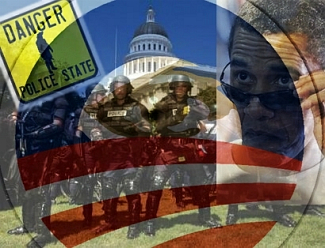

By Frank Morales
Back in 1992 the Pentagon’s Joint Chiefs of Staff held a “Strategy Essay Competition.”
The winner was a National War College student paper entitled, “The Origins of the American Military Coup of 2012.” Authored by Colonel Charles J. Dunlap, Jr. the paper is a well documented, “darkly imagined excursion into the future.” The ostensibly fictional work is written from the perspective of an imprisoned senior military officer about to be executed for opposing the military takeover of America, a coup accomplished through “legal” means. The essay makes the point that the coup was “the outgrowth of trends visible as far back as 1992,” including “the massive diversion of military forces to civilian uses,” particularly law enforcement.
Continue reading the article . . .
Related reading:
Judge Katherine Forrest’s 6/6/12 memorandum and order clarifying that her 5/12 injunction against enforcement of NDAA Section 1021(b) was not as limited as the government argued (I.e., that the injunction applies only to named plaintiffs), but rather “against anyone until further action by this, or a higher, court – or by Congress”: Hedges v Obama Judge memorandum and order 06.06.2012
Excerpt from original ruling — Judge Forrest’s summary of plaintiffs’ position:
“In support of their motion, plaintiffs [seven dissidents, including Chris Hedges, Dan Ellsberg, Noam Chomsky, and Birgitta Jonsdottir] assert that § 1021 already has impacted their associational and expressive activities—and would continue to impact them, and that § 1021 is vague to such an extent that it provokes fear that certain of their associational and expressive activities could subject them to indefinite or prolonged military detention.”
Excerpt from original ruling — Judge Forrest’s summary of the government’s position:
“The Government opposes plaintiffs’ request for preliminary injunctive relief on three bases: first, that plaintiffs lack standing; second, that even if they have standing, they have failed to demonstrate an imminent threat requiring preliminary relief; and, finally, through a series of arguments that counter plaintiffs’ substantive constitutional challenges, that Section 1021 of the NDAA is simply an “affirmation” or “reaffirmation” of the authority conferred by the 2001 Authorization for Use of Military Force, Pub. L. 107-40, 115 Stat. 224 (Sept. 18, 2011) (the “AUMF”), passed in the wake of September 11, 2001.”
Government’s memorandum of law supporting its motion for reconsideration.
